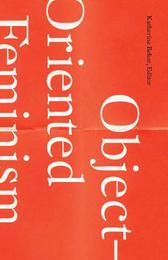
|
Object-Oriented Feminism
Hardback
Main Details
| Title |
Object-Oriented Feminism
|
| Authors and Contributors |
Edited by Katherine Behar
|
| Physical Properties |
| Format:Hardback | | Pages:280 | | Dimensions(mm): Height 216,Width 140 |
|
| Category/Genre | The arts - general issues
Philosophy |
|---|
| ISBN/Barcode |
9781517901080
|
| Classifications | Dewey:305.4201 |
|---|
| Audience | | General | | Professional & Vocational | |
|---|
| Illustrations |
32
|
|
Publishing Details |
| Publisher |
University of Minnesota Press
|
| Imprint |
University of Minnesota Press
|
| Publication Date |
1 November 2016 |
| Publication Country |
United States
|
Description
The essays here explore object-oriented feminism: a feminist intervention into recent philosophical discourses-like speculative realism, object-oriented ontology, and new materialism-that take objects, things, stuff, and matter as primary. Seeking not to define object-oriented feminism but rather to enact it, the volume is interdisciplinary in approach, with contributors from a variety of fields, including sociology, anthropology, English, art, and philosophy.
Author Biography
Katherine Behar is an interdisciplinary media and performance artist and assistant professor of new media arts at Baruch College, City University of New York. She is the author of Bigger than You: Big Data and Obesity, and the co-author, with Emmy Mikelson, of And Another Thing: Nonanthropocentrism and Art. Her art publications include Katherine Behar: E-Waste.
Reviews"Taking on object-oriented ontologies and speculative realism, the authors of these essays are not shy in reestablishing feminist theory as a primary resource for thinking about objects, things and environments. The editor, Katherine Behar, offers a brilliant introduction to object-oriented feminism and the encounter it stages with current philosophical trends."-Patricia Ticineto Clough, author of Autoaffection and coeditor of Beyond Biopolitics "Object-Oriented Feminism will be of particular interest for readers in feminist theory, philosophy and poststructuralism as they intersect with curatorial and art practices, and thus also being interesting for artists, curators and cultural workers navigating their ways in the worlds of theory and philosophy."-Identities: Journal for Gender, Politics and Culture
|